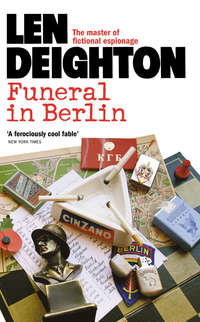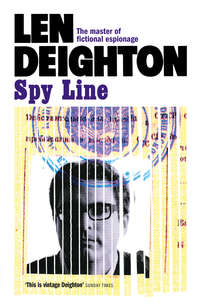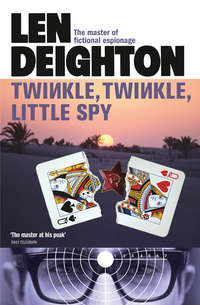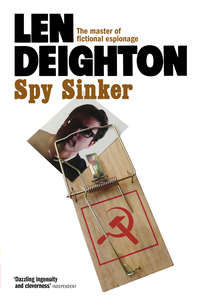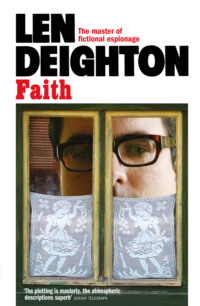
Полная версия
Mexico Set
I slid open the glass door and went outside on to the balcony. The weather had become stormy. Thin ragged clouds raced across the moon, and the wind had risen so that its roar was confused with the sound of the breakers on the rocks below. I watched the car. The headlights were high and close together, a configuration that suggested some Jeep-like vehicle, as did the way it negotiated the bad road. It was still going at speed as it swung round the back to the garage area. The driver had been here before.
There were two voices; one of the men had a key to the front door. I went through the guest bedroom and crouched on the interior gallery so that I could hear them speaking in the lounge below.
‘He’s run away,’ said one voice.
‘Perhaps,’ said the other, as if he didn’t care. They were speaking in German. There was no mistaking the Berlin accent of Erich Stinnes, but the other man’s German had a strong Russian accent.
‘His car is not here,’ said the first man. ‘What if the Englishmen arrived before us and took him off with them?’
‘We would have passed them on the road,’ said Stinnes. He was perfectly calm. I heard the sound of him putting his weight on to the big sofa. ‘That’s better.’ A sigh. ‘Take a drink if you want it. It’s in the cabinet in his study.’
‘That stinking jungle road. I could do with a bath.’
‘You call that jungle?’ said Stinnes mildly. ‘Wait till you go over to the east coast. Wait until you go across to the training camp where the freedom fighters are trained, and cut your way through some real tropical rain forest with a machete, and spend half the night digging chiggers out of your backside. You’ll find out what a jungle is like.’
‘What we came through will do for me,’ said the first man.
I raised my head over the edge of the gallery until I could see them. They were standing in the moonlight by the tall window. They were wearing dark suits and white shirts and trying to look like Mexican businessmen. Stinnes was about forty years old: my age. He had shaved off the little Leninstyle beard he’d had when I last saw him but there was no mistaking his accent or the hard eyes glittering behind the circular gold-rimmed spectacles.
The other man was much older, fifty at least. But he was not frail. He had shoulders like a wrestler, cropped head and the restless energy of the athlete. He looked at his watch and then out of the window and then walked over to the place where the tiles were being repaired. He kicked the trowel so that it went skidding across the floor and hit the wall with a loud noise.
‘I told you to have a drink,’ said Stinnes. He did not defer to the other man.
‘I said you should frighten Biedermann. Well, you’ve frightened him all right. It looks as if you’ve frightened him so much that he’s cleared out of here. That’s not what they wanted you to do.’
‘I didn’t frighten him at all,’ said Stinnes calmly. ‘I didn’t take your advice. He’s already too frightened. He needs reassurance. But he’ll surface sooner or later.’
‘Sooner or later,’ repeated the elder man. ‘You mean he’ll surface after you’ve gone back to Europe and be someone else’s problem. If it was left to me, I’d make Biedermann a number-one priority. I’d alert every last KGB team in Central America. I’d teach him that an order is an order.’
‘Yes, I know,’ said Stinnes. ‘It’s all so easy for you people who sit at desks all your life. But Biedermann is just one small part of a complicated plan … and neither of us knows exactly what the plan is.’
It was a patronizing reproach, and the elder man’s soft voice did not conceal the anger in him. ‘I say he’s the weak link in the chain, my friend.’
‘Perhaps he is supposed to be just that,’ said Stinnes complacently. ‘One day maybe the Englishwoman will put you in charge of one of her crazy schemes, and then you’ll be able to ignore orders and show everyone what a clever man you are in the field. But until that time you’ll do things the way you’re ordered to do them, no matter how stupid it all seems.’ He got to his feet. ‘I’ll have a drink, even if you don’t want one. Biedermann has good brandy.’
Stinnes passed below me out of sight and I heard him go into the study and pour drinks. When he returned he was carrying two glasses. ‘It will calm you, Pavel. Have patience; it will work out all right. You can’t rush these things. You’ll have to get used to that. It’s not like chasing Moscow dissidents.’ He gave the elder man a glass and they both drank. ‘French brandy. Schnapps and beer are not worth drinking unless they come from a refrigerator.’ He drank. ‘Ah, that’s better. I’ll be glad to be back in Berlin, if only for a brief spell.’
‘I was in Berlin in 1953,’ said the elder man. ‘Did you know that?’
‘So was I,’ said Stinnes.
‘In ’53? Doing what?’
Stinnes chuckled. ‘I was only ten years old. My father was a soldier. My mother was in the army too. We were all kept in the barracks during the disturbances.’
‘Then you know nothing. I was in the thick of it. The bricklayers and builders working on those Stalinallee sites started all the trouble. It began as a protest against a ten per cent increase in work norms. They marched on the House of Ministries in Leipzigerstrasse and demanded to see the Party leader, Ulbricht.’ He laughed. It was a low, manly laugh. ‘But it was the poor old Mining Minister who was sent out to face them. I was twenty. I was with the Soviet Control Commission. My chief dressed me up like a German building worker and sent me out to mix with the mob. I was never so frightened in all my life.’
‘With your accent you had every cause to be frightened,’ said Stinnes.
His colleague was not amused. ‘I kept my mouth shut; but I kept my ears open. That night the strikers marched across to the RIAS radio station in West Berlin and wanted their demands to be transmitted over the Western radio. Treacherous German swine.’
‘What were their demands?’ asked Stinnes.
‘The usual: free and secret elections, cuts in the work norms, no punishment for the trouble-makers.’ The older man drank some more. He was calmer now that he’d had a drink. ‘I advised my people to bring our boys out to clear the streets the way we’d cleared them in 1945. I told them to announce an immediate curfew and give the army shoot-on-sight orders.
‘But they didn’t,’ said Stinnes.
‘I was only twenty years old. The men who’d fought in the war had no time for kids like me. The Control Commission was not taken seriously. So they sat up all night hoping that everything would be all right in the morning.’
‘The disturbances spread next day.’
‘By 11 a.m. on 17th June they were tearing the red flag down from the Brandenburg Gate and ransacking the Party offices.’
‘But the army sat on it, didn’t they?’
‘Eventually they had to. There were strikes all over the country: Dresden, Leipzig, Jena and Gera, even in Rostock and the Baltic island of Rügen. It took a long time before things settled down. They should have acted immediately. Since then I’ve had no sympathy for people who tell me to have patience because everything will come out all right.’
‘And that’s what you’d like me to do now?’ asked Stinnes mockingly. ‘Bring our boys out to clear the streets the way we cleared them in 1945? Announce an immediate curfew and give the army shoot-on-sight orders?’
‘You know what I mean.’
‘You have no idea what this business is all about, Pavel. You’ve spent your career running typewriters; I’ve spent mine running people.’
‘What do you mean?’
‘You rush in like a rapist when we are in the middle of a seduction. Do you really think you can march agents up and down like Prussian infantry? Don’t you understand that men such as Biedermann have to be romanced?’
‘We should never use agents who are not politically dedicated to us,’ said Pavel.
Stinnes went to the window and I could see him clearly in the moonlight as he looked at the sea. Outside, the wind was roaring through the trees and making thumping noises against the windows. Stinnes held his drink up high and swirled it round to see the expensive brandy cling to the glass. ‘You’ve still got that passion that I once had,’ said Stinnes. ‘How do you hang on to all your illusions, Pavel?’
‘You’re a cynic,’ said the elder man. ‘I might as well ask how you continue doing your job without believing in it.’
‘Believing?’ said Stinnes, drinking some of the brandy and turning back to face his companion. ‘Believing what? Believing in my job or believing in the socialist revolution?’
‘You talk as if the two beliefs are incompatible.’
‘Are they compatible? Can a “workers and peasants state” need so many secret policemen like us?’
‘There is a threat from without,’ said the elder man, using the standard Party cliché.
‘Do you know what Brecht wrote after the 17th June uprising? Brecht I’m talking about, not some Western reactionary. Brecht wrote a poem called “The Solution”. Did you ever read it?’
‘I’ve no time for poetry.’
‘Brecht asked, would it not be easier for the government to dissolve the people, and vote itself another?’
‘Do you know what people say of you in Moscow?’ the older man asked. ‘They say, is this man a Russian or is he a German?’
‘And what do you say when people ask that question of you, Pavel?’
‘I had never met you,’ said the elder man, ‘I knew you only by reputation.’
‘And now? Now that you’ve met me?’
‘You like speaking German so much that sometimes I think you’ve forgotten how to speak Russian.’
‘I haven’t forgotten my mother tongue, Pavel. But it is good for you to practise German. Even more you need Spanish, but your appalling Spanish hurts my ears.’
‘You use your German name so much, I wonder if you are ashamed of your father’s name.’
‘I’m not ashamed, Pavel. Stinnes was my operational name and I have retained it. Many others have done the same.’
‘You take a German wife and I wonder if Russian girls were not good enough for you.’
‘I was on active service when I married, Pavel. There were no objections then as I remember.’
‘And now I hear you talk of the June ’53 uprising as if you sympathized with the German terrorists. What about our Russian boys whose blood was spilled restoring law and order?’
‘My loyalty is not in question, Pavel. My record is better than yours, and you know that.’
‘But you don’t believe any more.’
‘Perhaps I never did believe in the way that you believe,’ said Stinnes. ‘Perhaps that’s the answer.’
‘There’s no half-way,’ said the elder man. ‘Either you accept the Party Congress and its interpretation of Marxist-Leninism or you are a heretic.’
‘A heretic?’ said Stinnes, feigning interest. ‘Extra ecclesiam nulla salus; no salvation is possible outside the Church. Is that it, Pavel? Well, perhaps I am a heretic. And it’s your misfortune that the Party prefers that, and so does the service. A heretic like me does not lose his faith.’
‘You don’t care about the struggle,’ said the elder man. ‘You can’t even be bothered to search the house.’
‘There’s no car, and no boat at the dock. Do you think a man such as Biedermann would come on foot through the jungle that frightens you so much?’
‘You knew he wouldn’t be here.’
‘He’s a thousand miles away by now,’ said Stinnes. ‘He’s rich. A man like that can go anywhere at a moment’s notice. Perhaps you haven’t been in the West long enough to understand how difficult that makes our job.’
‘Then why did we drag ourselves out here through that disgusting jungle?’
‘You know why we came. We came because Biedermann told us the Englishman phoned and said he was coming here. We came because the stupid woman in Berlin sent a priority telex last night telling us to come here.’
‘And you wanted to prove Berlin was wrong. You wanted to prove you know better than she knows.’
‘Biedermann is a liar. We have found that over and over again.’
‘Then let’s get on the road back,’ said the older man. ‘You’ve proved your point; now let’s get back to Mexico City, back to electric light and hot water.’
‘The house must be searched. You are right, Pavel. Take a look round. I will wait here.’
‘I have no gun.’
‘If anyone kills you, Pavel, I will get them.’
The elder man hesitated as if about to argue, but he went about his task, nervously poking about with his flashlight, while Stinnes watched him with ill-concealed contempt. He came upstairs too but he was an amateur. I stepped outside to avoid him. I need not have bothered even to do that, for he did little more than shine a light through the doorway to see if the bed was occupied. After no more than ten minutes he was back in the lounge telling Stinnes that the house was empty. ‘Now can we go back?’
‘You’ve gone soft, Pavel. Is that why Moscow sent you to be my assistant?’
‘You know why Moscow sent me here,’ the elder man grumbled.
Stinnes laughed briefly and I heard him put his glass down on the table. ‘Yes, I read your personal file. For “political realignment”. Whatever did you do in Moscow that the department thinks you are not politically reliable?’
‘Nothing. You know very well that that bastard got rid of me because I discovered he was taking bribes. One day his turn will come. A criminal like that cannot survive for ever.’
‘But meanwhile, Pavel, you suit me fine. You are politically unreliable and so the one man I can be sure will not report my unconventional views.’
‘You are my superior officer, Major Stinnes,’ said the older man stuffily.
‘That’s right. Well, let’s head back. You’ll drive for the first couple of hours. I will drive when we reach the mountains. If you see anything in the road drive over it. Too many people get killed on these roads swerving to avoid eyes they see shining in the headlights.’
4
I didn’t sleep again after they departed. I dozed fitfully but imagined I could hear their diesel car returning, with the alternate roars and screams that a really bad surface racks from a small engine. But it was just the wind, and then, as dawn came and the storm passed over, I was kept awake by the screeching and chattering of the animals. They came right down to the water through the thick undergrowth that bordered one side of the house. There was a stream there; it passed close by a window of Paul Biedermann’s study. I suppose he liked to watch the animals. It was an aspect of Biedermann’s character that I’d not yet encountered.
Dawn shone its hard grey light and made the sea look like granite. I went down to the kitchen and found some canned food: beans and tomatoes. I could find no way of warming the mixture so I ate a plateful cold. I was hungry.
From the kitchen window there was a view back towards the village. That way the sky was light pink. I counted seven vultures, circling very high and looking for breakfast. Nearer to the house there were birds in the trees making a lot of noise, and monkeys scrambling about in the lower branches with occasional forays into the garden.
I would have given a lot for a cup of coffee, but instant powder stirred into cold tinned milk did not appeal. I made do with a shot of Biedermann’s brandy. It was everything Stinnes said about it. So good, in fact, that I took another.
Fortified by the strong drink, and one of Biedermann’s fancy striped sweaters chosen from his wardrobe, I went outside. The sky was overcast to give a cold shadowless light and, although the black clouds had gone, there was still a cold wind from the ocean. The tyre marks of the jeep were to be seen on the roadway. I followed the new macadam road to the entrance gate. It was open, its chain freshly cut. Despite the borrowed sweater I was cold, and colder still as I circled the house completely, crossed the patio that was sheltered from the wind, and climbed up the hill at the back to the highest point of rock. I couldn’t see the road or the village but there was a haze of woodsmoke rising from where I guessed the village must be. I couldn’t see any sign of Biedermann or his car. That was the first time I’d noticed the swimming pool. It was about two hundred metres from the house and hidden by a line of junipers planted by some landscape gardener for that purpose.
The pool was big, and very blue. And full length on the bottom, at the deep end, was a human figure. At first I thought it was a drowning case. Wrapped in cheap grey blankets, the figure made a shapeless bundle that almost disappeared in the dark depths of blue shade. It was only when I got past the wooden building that housed four changing rooms and filtering and heating equipment that I was sure that the pool was dry and drained.
‘Hey!’ I shouted at the inert figure. ‘Tu que haces?’
Very slowly the blankets became unravelled to reveal a man dressed in badly wrinkled white trousers and a T-shirt advertising Underberg. One of his bare sunburned arms bore a lacework of neat white scar tissue, and so did one side of his face. He blinked and squinted into the light, trying to see me against the glaring sky.
‘Paul Biedermann,’ I shouted. ‘What the hell are you doing in the pool?’
‘You came,’ he said. His voice was hoarse and he coughed to clear his throat. ‘The others have gone? How did you get here?’
‘It’s Bernd,’ I said. ‘We spoke on the phone; Bernd Samson. I walked. Yes, the other two drove away hours ago.’ He must have been watching the road. My approach along the track had gone unobserved from wherever he’d been hiding.
Wrapped into his blanket I could see a hunting rifle. Biedermann pushed it away as he bent his head forward almost to his knees and stretched his arms. Then he rubbed his legs and arms, trying to restore his circulation. It must have been very uncomfortable on the hard, cold surface of the concrete pool all night. He looked up and then smiled as he recognized me. It was a severe smile, twisted by the puckered scars that marked one side of his face.
‘Bernd. Are you alone?’ he said, trying to make it sound as if it meant no more to him than how many cups of coffee to order. His face and arms were blue; it was the light reflected from the painted sides of the pool.
‘They’ve gone,’ I said. ‘Come and switch the electricity on, and make me a cup of coffee.’
He slung the rifle on his shoulder and climbed up the ladder of the empty pool. He left the blanket where it was. I wondered if he intended to spend another uncomfortable night here.
He moved about like an automaton. Once inside the house he showed me all the things I should have found for myself. There was bottled gas for cooking, a generator for lighting, and a battery-powered Sony short-wave radio. He boiled water and measured out coffee in silence. It was as if he wanted to take as long as he could to defer the start of the conversation. Even when we were both seated in his study, hands clasped round cups of strong black coffee, he still didn’t offer any explanation about his curious behaviour. I said nothing. I waited for him to speak. It was usually better that way and I wanted to see how he would start, and even more importantly what he would avoid.
‘I’ve got everything,’ said Paul Biedermann. ‘Plenty of money, my health, and a wife who stood by me after the accident. Even after that girl was killed in my car.’ It was hard to believe that this was the nervous schoolboy I’d known in Berlin. It was not just the strong American accent he’d acquired at his expensive East Coast school but something in his poise and his manner too. Paul Biedermann had become unreservedly American in a way that only Germans are able to do.
‘That was a nasty business,’ I said.
‘I was unconscious three days. I was in hospital almost six months altogether, counting the convalescence. Six months; and I hate hospitals.’ He drank some coffee. It was a heavy Mexican coffee that Biedermann had turned into a devil’s brew that made my teeth tingle. ‘But then I got entangled with those bastards and I haven’t slept properly ever since. Do you know that, Bernd? It’s the literal truth that I haven’t slept really well since the start of it.’
‘Is that so,’ I said. I didn’t want to sit there with my tongue hanging out. I wanted to sound casual; bored, almost. But I wanted to know, especially after I’d heard Stinnes and his pal talking about Biedermann as if he was a KGB agent.
‘The Russians,’ said Biedermann, ‘spies and all that. You know what I’m talking about, don’t you?’ He was looking over my shoulder as if he wanted to see the animals and birds in the trees outside.
‘I know what you’re talking about, Paul,’ I said.
‘Because you’re in all that, aren’t you?’
‘In a manner of speaking,’ I said
‘I was talking to my sister Poppy. She met you at a dinner party at the house of one of the big Berlin spy chiefs. You’re one of them, Bernd. You probably always have been. Was that why your father sent you to school in Berlin, instead of sending you back to England the way the other British families sent their kids back there to go to school?’
‘Who were they, Paul? Who were those men who came in the night?’
‘I didn’t see you arrive. I was out with the gun, shooting lizards. I hate lizards, don’t you? Those Russkies are like lizards, aren’t they? Especially the one with glasses. I knew they would come, and I was right.’
‘How well do you know them?’
‘They pass me around like a parcel. I’ve dealt with so many different Russians that I’ve almost lost count. These two were sent from Berlin. The one with the strong Berlin accent calls himself Stinnes but he’s not really a German, he’s a Russian. The other one calls himself Pavel Moskvin. It sounds like a phoney name, doesn’t it? I still haven’t figured out if they work from Moscow or are part of the East German intelligence service. What do you think, Bernd?’
‘Moskvin means “man from Moscow”. It could be a genuine name. Do they have diplomatic cover?’
‘They said they do.’
‘Then they are Russians. The KGB give almost all their people diplomatic cover. The East Germans don’t. They work mostly in West Germany and infiltrate their agents among the refugees going there.’
‘Why?’
‘It’s part of the overall contingency plan. East German agents in West Germany are hard to find. They don’t need the cover. And in other parts of the world East German networks survive after Russians with diplomatic cover are discovered and kicked out.’
‘They never answer any questions. I thought they’d leave me alone, now that I spend most of the year in Mexico.’ Not most of the time but most of the year. Most of the financial year; it was a fiscal measurement of time.
‘How did you get entangled with the Russians, Paul?’ I asked, carefully using his own words.
‘What am I supposed to do? I’ve got half my family still living over there in Rostock. Am I supposed to tell them to go to hell so that they take it out on my aunts and uncles?’
‘Yes, that’s what you’re supposed to do,’ I said.
‘Well, I didn’t,’ said Biedermann. ‘I played along with them. I told them I’d do nothing serious but I played along when they asked for run-of-the-mill jobs.’
‘What did they get you to do?’
‘Laundering money. They never asked me to give them money – they seem to have plenty of that to throw around. They wanted Deutschmarks changed into dollars, Swedish kronor changed into Mexican pesos and vice versa, Latin American currencies changed into Dutch guilders.’
‘They could have all that done at a money exchange in West Berlin.’
He smiled and stared at something beyond me and drank his coffee. ‘Ja,’ he said, forgetting for a moment that we were speaking English. He touched the side of his face as if discovering the terrible scars for the first time. ‘There was a difference; the money was sent to me in large cash transfers and I had to pass it on in small contributions and donations.’
‘Pass it on how?’
‘By mail.’
‘In small amounts?’


